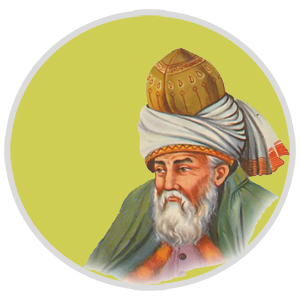Jalal al-Din Muhammad Rumi
مولانا جلال الدین محمد رومی

- Born
- Died
- Nationality
- 30 September 1207
- 17 December 1273 (aged 66)
- Khwarezmian Empire, then Sultanate of Rum
Introduction
Maulana Rumi
A 13th-century Persian poet, jurist, Islamic philosopher, theologian, and Sufi mystic by the name of Jalal al-Din Muhammad Rumi. His writings have endured the test of time and cultural boundaries, enthralling readers everywhere with his profound knowledge, ethereal insights, and poetic artistry. We will examine Rumi, the poet of divine love, and his life, philosophy, and continuing impact in this post.
Resting place
Tomb of Mevlana Rumi, Mevlana Museum, Konya, Turkey
Notable work
Early life
I. Birth and Heritage:
On September 30, 1207, in the city of Balkh, which is now in Afghanistan, Rumi was born. He was exposed to a wide range of ideologies and customs at a young age because his birthplace was a hub of intellectual and cultural activity. His father, Baha Walad, was a well-known theologian and jurist who came from a family of academics and judges.
II. Migration and Education:
Rumi’s family left Balkh due to political upheaval, traveled, and finally settled in Konya, Anatolia (modern-day Turkey). Rumi pursued his study in Konya under the direction of eminent academics of the day. His intellectual prowess and unquenchable curiosity were clear, establishing the foundation for his future scholarly endeavors.
III. Spiritual Mentorship:
When Rumi first encountered the traveling mystic and spiritual advisor Shams Tabrizi, his life underwent a profound transformation. Rumi experienced a great inner awakening as a result of their profound spiritual relationship with Shams. Under Shams’ guidance, Rumi descended into the depths of Sufi mysticism and set out on a profound spiritual journey that would influence his later writings, including his poetry and teachings.
IV. Literary Pursuits:
Rumi had a strong interest in literature and poetry from a young age. He started writing poetry at a young age, which was a reflection of his intense study of the heavenly mysteries and the human spirit. His early creative efforts hinted at the brilliant poetry that would eventually define his works.
V. Legacy of Love and Compassion:
Rumi’s early experiences with love, compassion, and spiritual inquiry grew into the timeless wisdom and poetic eloquence that have inspired countless people throughout the years. Readers all over the world continue to be moved by his capacity to convey great spiritual truths via poetry and his unshakable dedication to the way of love.
Conclusion:
The early years of Maulana Rumi’s life were characterized by his intellectual curiosity, spiritual quest, and outstanding mentorship. He was able to make his immeasurable contributions to Sufi thought and poetry because to these formative experiences. Rumi’s transformation from a perplexed young scholar to a respected Sufi master is evidence of the enduring value of a life dedicated to love, wisdom, and the divine as well as the transformational power of spiritual mentoring.
Works
Legacy
I. Universal Love and Compassion:
One of Maulana Rumi’s most significant contributions is his emphasis on universal love and compassion. His poetry speaks to the depths of the human heart, promoting love that transcends boundaries of nationality, religion, and culture. Maulana Rumi’s teachings advocate for the idea that love is the essence of spirituality, a force that unites all beings in a shared human experience.
II. The Path of Spiritual Enlightenment:
Maulana Rumi’s works, especially his masterpiece “Mathnawi,” serve as a guiding light for seekers on the path of spiritual enlightenment. Through allegorical stories and poetic metaphors, he explores profound Sufi concepts, leading readers on a transformative journey toward self-discovery and divine union. His teachings emphasize the importance of inner contemplation, mindfulness, and the pursuit of inner illumination.
III. Poetry as a Source of Healing:
Maulana Rumi’s poetry has a therapeutic quality, offering solace to those in emotional turmoil. His verses have been embraced by readers seeking healing, comfort, and inspiration. In times of sadness or joy, Rumi’s words provide a sanctuary, reminding individuals of the resilience of the human spirit and the transformative power of love.
IV. Influence on Art and Culture:
Maulana Rumi’s influence extends beyond the realm of literature into various forms of art and culture. His poetry has been set to music, inspiring soul-stirring melodies and Sufi chants. Additionally, his philosophical ideas have influenced visual art, dance, and even contemporary literature, showcasing the enduring appeal of his message.
V. Interfaith Dialogue and Tolerance:
Maulana Rumi’s teachings of love, tolerance, and unity have made him a symbol of interfaith dialogue. His universal message resonates with individuals from different religious backgrounds, fostering understanding and acceptance among diverse communities. In an increasingly interconnected world, Rumi’s emphasis on harmony and acceptance serves as a beacon of hope.
VI. Conclusion:
Maulana Rumi’s legacy is not confined to a particular time or place; it is a timeless gift to humanity. His teachings continue to guide people on a journey of self-discovery, love, and spiritual awakening. In a world often divided by differences, Rumi’s enduring legacy reminds us of our shared humanity and the transformative power of love and wisdom. Through his poetry and philosophy, Rumi continues to inspire generations, inviting individuals to embrace the light of love and embark on a profound spiritual odyssey.